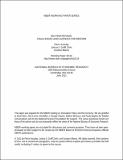National Institutes of Health Peer Review: Challenges and Avenues for Reform
Author(s)
Azoulay, Pierre; Graff Zivin, Joshua S.; Manso, Gustavo
Downloadw18116.pdf (251.9Kb)
OPEN_ACCESS_POLICY
Open Access Policy
Creative Commons Attribution-Noncommercial-Share Alike
Terms of use
Metadata
Show full item recordAbstract
The National Institute of Health (NIH), through its extramural grant program, is the primary public funder of health-related research in the United States. Peer review at NIH is organized around the twin principles of investigator initiation and rigorous peer review, and this combination has long been a model that science funding agencies throughout the world seek to emulate. However, lean budgets and the rapidly changing ecosystem within which scientific inquiry takes place have led many to ask whether the peer-review practices inherited from the immediate postwar era are still well suited to 21st-century realities. In this essay, we examine two salient issues: (1) the aging of the scientist population supported by NIH and (2) the innovativeness of the research supported by the institutes. We identify potential avenues for reform as well as a means for implementing and evaluating them.
Date issued
2013-01Department
Sloan School of ManagementJournal
Innovation Policy and the Economy
Publisher
University of Chicago Press
Citation
Azoulay, Pierre et al. “National Institutes of Health Peer Review: Challenges and Avenues for Reform.” Innovation Policy and the Economy 13 (January 2013): 1–22 © 2013 The National Bureau of Economic Research
Version: Original manuscript
ISSN
1531-3468
1537-2618